

Elliott Wave Principle. The Elliott wave principle is a form of technical analysis that some traders use to analyze financial market cycles and forecast market trends by identifying extremes in investor psychology, highs and lows in prices, and other collective factors. Ralph Nelson Elliott (1871–1948), a professional accountant, discovered the underlying social principles and developed the analytical tools in the 1930s. He proposed that market prices unfold in specific patterns, which practitioners today call Elliott waves, or simply waves. Elliott published his theory of market behavior in the book The Wave Principle in 1938, summarized it in a series of articles in Financial World magazine in 1939, and covered it most comprehensively in his final major work, Nature’s Laws: The Secret of the Universe in 1946. Overall design[edit] From R.N. Web Bot Predictions 2.0 w/ guest: Cliff High – 03/12/11 : Truth Frequency. In 1975, I suffered a career ending knee injury that shattered my Olmypic hockey dream, and left me in contant chronic pain.
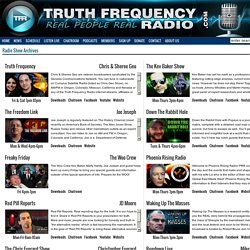
As I prayed for a return to a pain free life, two teachers provided my path to healing: T. Consciosness. Zeitgeist: The Movie, Zeitgeist: Addendum, Zeitgeist Moving Forward. The construct. FKN Newz - Most Recent Videos. Landocracy. The Real News Network. North East Truth. What happens when you speak outside Free Speech Zone. Get Out Of Debt Free.
English freeman standing in court-council tax the take down begins.1. Strawman Freedom Sovereign Patriot "How To" by: Dario Busch. Welcome to Project Camelot Portal. Institute of Noetic Sciences. Andreas Moritz welcomes you to Ener-Chi Wellness Center: Your Trusted Source of Natural Healing Methods. Noetic Tools « Institute of Noetic Sciences UK Community Group (UKIONS) Noetic Tools Noetic Audio Tools.
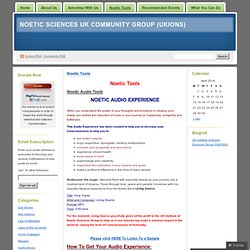
Webbotforum's Channel Mark Cocking. Alex Jones' Prison Planet.com. Selected excerpts from: Blue Blood, True Blood, Conflict and Creation - 1. Preface As far as the history of this planet is concerned, you can consider that everything you ever learned is a complete lie.
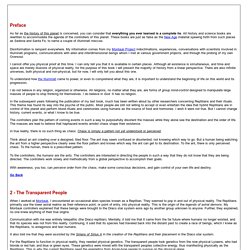
DORway » Aspartame & Aspartame Poisoning Information Site. Cryptome. Empire - 'War on terror' through Muslim eyes. The Venus Project. Fadedglorytimes's Channel Changes in transformation. FinerMinds - Your daily dose of personal growth. Themes. 21st Century Thinking – Say ‘No’ To College?
Nigel Marsh: How to make work-life balance work. The 10 Most Puzzling Ancient Artifacts. Transcendental Meditation - Official UK website. Good Vibrations. Merkaba i medytacja dźwięku: relacja z pobytu w Egipcie. Maharishi Effect. Multidimensional: Merkaba. Breath of Fire Kundalini Yoga Breathing Exercise.
Reiki. Traditions[edit] Today many branches of Reiki exist, though there exist two major traditions, respectively called Traditional Japanese Reiki and Western Reiki.
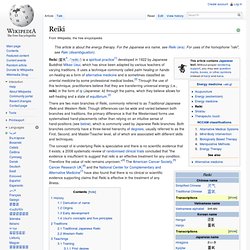
Traditional Japanese Reiki[edit] The term Traditional Japanese Reiki is normally used to describe the specific system that formed from Usui's original teachings[41] and the teachings that did not leave Japan. During the 1990s, Western teachers travelled to Japan in order to find this particular tradition of Reiki, though found nothing. They therefore started to establish Reiki schools, and started to teach Reiki levels 1 and 2 to the Japanese. CTOE. What the bleep do we know (part 1) KYMATICA - FULL LENGTH MOVIE - Expand Your Consciousness!!! The Robert Anton Wilson Website. Plato. Plato (/ˈpleɪtoʊ/; Greek: Πλάτων Plátōn "broad"pronounced [plá.tɔːn] in Classical Attic; 428/427 or 424/423 – 348/347 BCE) was a philosopher, as well as mathematician, in Classical Greece.
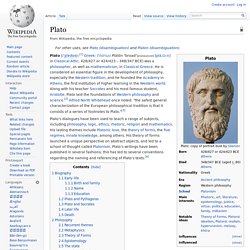
He is considered an essential figure in the development of philosophy, especially the Western tradition, and he founded the Academy in Athens, the first institution of higher learning in the Western world. Along with his teacher Socrates and his most famous student, Aristotle, Plato laid the foundations of Western philosophy and science.[2] Alfred North Whitehead once noted: "the safest general characterization of the European philosophical tradition is that it consists of a series of footnotes to Plato.
" Argumentum ad populum. "Ad populum" redirects here.
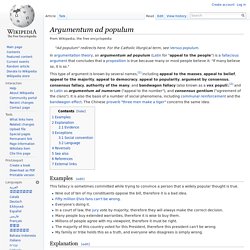
For the Catholic liturgical term, see Versus populum. Hermetica. Scope[edit] The term particularly applies to the Corpus Hermeticum, Marsilio Ficino's Latin translation in fourteen tracts, of which eight early printed editions appeared before 1500 and a further twenty-two by 1641.[2] This collection, which includes the Pœmandres and some addresses of Hermes to disciples Tat, Ammon and Asclepius, was said to have originated in the school of Ammonius Saccas and to have passed through the keeping of Michael Psellus: it is preserved in fourteenth century manuscripts.[3] The last three tracts in modern editions were translated independently from another manuscript by Ficino's contemporary Lodovico Lazzarelli (1447–1500) and first printed in 1507.
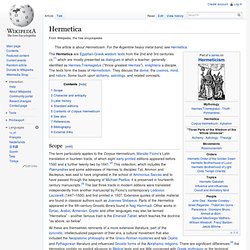
Ad hominem. An ad hominem (Latin for "to the man" or "to the person"[1]), short for argumentum ad hominem, is a general category of fallacies in which a claim or argument is rejected on the basis of some irrelevant fact about the author of or the person presenting the claim or argument.[2] Fallacious Ad hominem reasoning is normally categorized as an informal fallacy,[3][4][5] more precisely as a genetic fallacy,[6] a subcategory of fallacies of irrelevance.[7] Ad hominem reasoning is not always fallacious, for example, when it relates to the credibility of statements of fact.
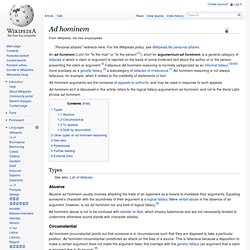
Ad hominem arguments are the converse of appeals to authority, and may be used in response to such appeals. Ad hominem as it is discussed in this article refers to the logical fallacy argumentum ad hominem, and not to the literal Latin phrase ad hominem. Types Abusive. Heuristic. A heuristic technique (/hjʉˈrɪstɨk/; Greek: "Εὑρίσκω", "find" or "discover"), sometimes called simply a heuristic, is any approach to problem solving, learning, or discovery that employs a practical methodology not guaranteed to be optimal or perfect, but sufficient for the immediate goals.
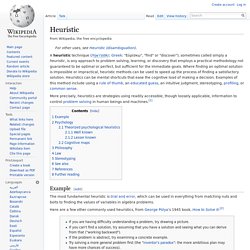
Where finding an optimal solution is impossible or impractical, heuristic methods can be used to speed up the process of finding a satisfactory solution. Heuristics can be mental shortcuts that ease the cognitive load of making a decision. Examples of this method include using a rule of thumb, an educated guess, an intuitive judgment, stereotyping, profiling, or common sense. More precisely, heuristics are strategies using readily accessible, though loosely applicable, information to control problem solving in human beings and machines.[1] Example[edit] Argument from ignorance. Argument from ignorance (Latin: argumentum ad ignorantiam), also known as appeal to ignorance (in which ignorance stands for "lack of evidence to the contrary"), is a fallacy in informal logic.

It asserts that a proposition is true because it has not yet been proven false (or vice versa). This represents a type of false dichotomy in that it excludes a third option, which is that there is insufficient investigation and therefore insufficient information to prove the proposition satisfactorily to be either true or false.
Nor does it allow the admission that the choices may in fact not be two (true or false), but may be as many as four, Anotherhermeticum.pdf (application/pdf Object) The Prince. The Prince (Italian: Il Principe [il ˈprin.tʃi.pe]) is a 16th-century political treatise by the Italian diplomat and political theorist Niccolò Machiavelli. From correspondence a version appears to have been distributed in 1513, using a Latin title, De Principatibus (About Principalities). However, the printed version was not published until 1532, five years after Machiavelli's death. Machiavelli: The Prince: Contents.
Neuro-linguistic programming. Not to be confused with Natural language processing (also NLP) Neuro-linguistic programming (NLP) is an approach to communication, personal development, and psychotherapy created by Richard Bandler and John Grinder in California, United States in the 1970s. Its creators claim a connection between the neurological processes ("neuro"), language ("linguistic") and behavioral patterns learned through experience ("programming") and that these can be changed to achieve specific goals in life.[1][2] Bandler and Grinder claim that the skills of exceptional people can be "modeled" using NLP methodology, then those skills can be acquired by anyone.[3][4][5][6][7] Bandler and Grinder also claim that NLP can treat problems such as phobias, depression, habit disorder, psychosomatic illnesses, myopia,[8] allergy, common cold,[9] and learning disorders, often in a single session.[10][11][12][13] NLP has been adopted by some hypnotherapists and in seminars marketed to business and government.[14][15]
Holophonic Sounds - Tricking Your Mind To See Alternate Realities. An afternoon nap markedly boosts the brain’s learning capacity. If you see a student dozing in the library or a co-worker catching 40 winks in her cubicle, don’t roll your eyes. New research from the University of California, Berkeley, shows that an hour’s nap can dramatically boost and restore your brain power. Stereoscopic audio-visual meditation Branwave Entertainment - видео Arts. Reprogramming Your Brain 1/5. Neuroscience of free will. Neuroscience of free will is the part of neurophilosophy that studies the interconnections between free will and neuroscience. As it has become possible to study the living brain, researchers have begun to watch decision making processes at work.
Findings could carry implications for our sense of agency and for moral responsibility and the role of consciousness in general.[1][2][3] Relevant findings include the pioneering study by Benjamin Libet and its subsequent redesigns; these studies were able to detect activity related to a decision to move, and the activity appears to begin briefly before people become conscious of it.[4] Other studies try to predict activity before overt action occurs.[5] Taken together, these various findings show that at least some actions - like moving a finger - are initiated unconsciously at first, and enter consciousness afterward.[6] A monk meditates.
Overview[edit] How To Stimulate the Right Brain. Hemispheres. Eyesite ~ Brain Hemisphere utilisation and orientation. My view of Hemispheric Dominance in the human brain. The Art of Insight and Action. Five glorious presentations on visual thinking. Data Visualization. Visual Thinking Strategies. Jain - Sacred Geometry & Vedic Mathematics.
Goetia. Color Psychology. By David Johnson. Sigil (magic) Native American languages. Evolution of language. Proto-Human language. Cave painting. Origin of language. Proto-linguistics - definition of Proto-linguistics by the Free Online Dictionary. The American Heritage® Dictionary of the English Language, Fourth Edition copyright ©2000 by Houghton Mifflin Company. Google Image Result for. Google Image Result for. QR code. Barcode. Robert Anton Wilson Talks About Pot & Perception! Video. 100 Most Inspirational Quotes Of All Time. 70 Things Every Computer Geek Should Know. 100 Best (Free) Science Documentaries Online.